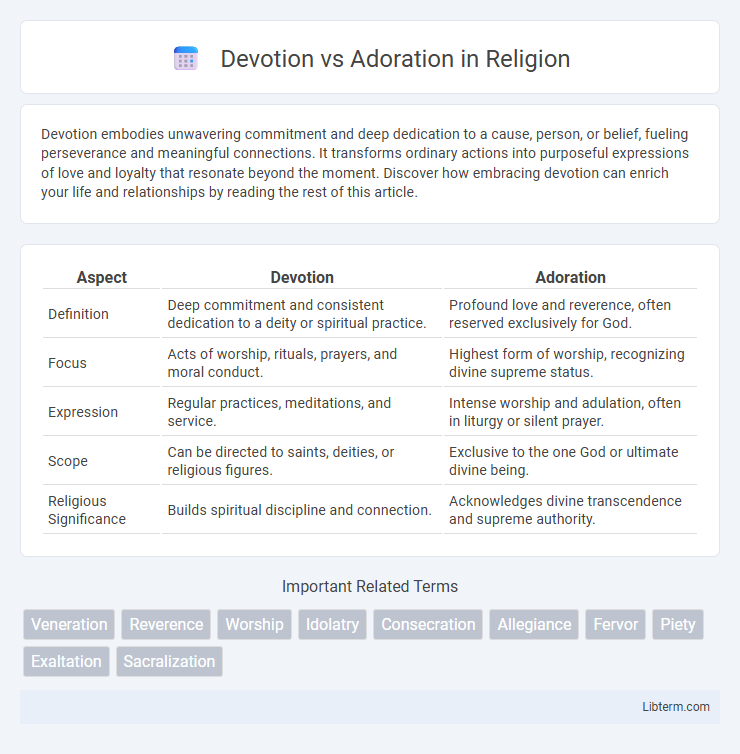Devotion embodies unwavering commitment and deep dedication to a cause, person, or belief, fueling perseverance and meaningful connections. It transforms ordinary actions into purposeful expressions of love and loyalty that resonate beyond the moment. Discover how embracing devotion can enrich your life and relationships by reading the rest of this article.
Table of Comparison
| Aspect | Devotion | Adoration |
|---|---|---|
| Definition | Deep commitment and consistent dedication to a deity or spiritual practice. | Profound love and reverence, often reserved exclusively for God. |
| Focus | Acts of worship, rituals, prayers, and moral conduct. | Highest form of worship, recognizing divine supreme status. |
| Expression | Regular practices, meditations, and service. | Intense worship and adulation, often in liturgy or silent prayer. |
| Scope | Can be directed to saints, deities, or religious figures. | Exclusive to the one God or ultimate divine being. |
| Religious Significance | Builds spiritual discipline and connection. | Acknowledges divine transcendence and supreme authority. |
Understanding Devotion: Key Concepts
Devotion involves a deep commitment and consistent practice towards a person, cause, or belief, characterized by loyalty and heartfelt dedication. It encompasses acts of service, rituals, or expressions that reinforce emotional and spiritual bonds over time. Unlike adoration, which centers on intense admiration or reverence, devotion reflects sustained involvement and a sense of duty.
Defining Adoration: A Deeper Connection
Adoration signifies an intense, reverent love that goes beyond basic devotion, embodying profound spiritual or emotional connection. It involves an unwavering focus and deep admiration directed at a person, deity, or ideal, reflecting a higher level of commitment and reverence. This deeper connection creates a transformative experience that nurtures devotion into a heartfelt, encompassing reverence.
Historical Perspectives on Devotion and Adoration
Historical perspectives on devotion and adoration reveal distinct cultural and religious evolutions where devotion often emphasizes steadfast dedication and disciplined practice, while adoration highlights profound reverence and worshipful awe. In ancient religious traditions such as Hinduism and Christianity, devotion (bhakti or fidelitas) developed through ritualistic commitment and personal piety, whereas adoration centered around divine presence and exaltation of the sacred. Scholarly analyses trace how these concepts shaped spiritual experiences, influencing liturgical practices and theological interpretations across centuries.
Emotional Dimensions: Devotion vs Adoration
Devotion involves a deep, often sustained emotional commitment characterized by loyalty and a sense of duty, fostering a profound bond that withstands challenges. Adoration centers on intense admiration and reverence, typically evoking feelings of awe and passion that can be more immediate and overwhelming. Both emotions engage the heart deeply but differ in duration and the nature of attachment, with devotion emphasizing steadfastness and adoration highlighting passionate intensity.
Religious and Spiritual Contexts
Devotion in religious contexts refers to a profound dedication and commitment to a deity, often expressed through consistent prayers, rituals, and acts of faith. Adoration signifies an intense form of worship characterized by deep love and reverence, frequently embodied in acts of praise and veneration toward the divine. Both terms emphasize a relationship with the sacred, but adoration highlights emotional intensity, while devotion encompasses ongoing loyalty and practice.
Psychological Impacts of Devotion and Adoration
Devotion fosters a deep psychological sense of commitment and purpose, enhancing emotional stability and resilience through consistent focus on a valued object or entity. Adoration, by evoking intense feelings of reverence and awe, can lead to heightened emotional experiences and a profound sense of connection that boosts self-esteem and motivation. Both devotion and adoration activate neural pathways associated with reward and attachment, contributing to improved mental well-being and social bonding.
Expressions and Manifestations in Daily Life
Devotion and adoration manifest distinctly in daily life through varied expressions, where devotion often appears as consistent acts of commitment, such as routine prayers, community service, or disciplined study, reflecting deep allegiance and faithful observance. Adoration is characterized by profound reverence and emotional intensity, shown in spontaneous gestures like heartfelt praise, veneration rituals, or moments of silent admiration, emphasizing a personal and exalted connection. Both devotion and adoration engage individuals in meaningful practices that affirm spiritual or emotional bonds, yet devotion emphasizes enduring dedication while adoration highlights passionate reverence.
Devotion and Adoration in Human Relationships
Devotion in human relationships involves a deep commitment and loyalty that fosters trust and emotional security, often expressed through consistent support and care over time. Adoration, on the other hand, emphasizes intense admiration and reverence, highlighting the appreciative and often idealized aspects of a person or bond. Both devotion and adoration enhance relational intimacy but serve different emotional functions, with devotion grounding relationships in steadfastness and adoration uplifting them with admiration.
Common Misconceptions and Differences
Devotion often refers to a sustained commitment or dedication to a person, cause, or deity, while adoration implies a profound love and reverence, typically toward a divine figure. A common misconception is that devotion and adoration are interchangeable, but devotion includes actions and practices over time, whereas adoration centers on intense, immediate emotional worship. Understanding their differences helps clarify religious and spiritual experiences, as devotion encompasses loyalty and discipline, whereas adoration highlights awe and veneration.
Cultivating Devotion and Adoration: Practical Tips
Cultivating devotion and adoration involves consistent practices like meditation, prayer, and reflective journaling that deepen emotional connection to a higher power or ideal. Engaging in community worship, chanting, or ritualistic ceremonies enhances spiritual focus and reinforces the bond of reverence. Incorporating gratitude and mindful presence into daily life fosters a continuous state of heartfelt devotion and adoration, enriching personal growth and spiritual fulfillment.
Devotion Infographic

 libterm.com
libterm.com